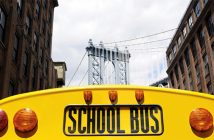
Critics were harsh when Mayor Michael Bloomberg closed dozens of large high school that were failing in New York City. They claimed the mayor was destroying communities and neighborhood institutions.
But this week a study was released by the Research Alliance for the New York City Schools at New York University saying that the closures benefited the eighth-graders who would have attended the schools that closed — and that the closings did not harm the students who were in the schools during the phase-out period.
The Wall Street Journal’s Leslie Brody says the study’s goal was to add data to the continuing and controversial issue of what to do about the lowest-performing schools in the city. Mayor Bill de Blasio said closing down struggling schools would be his last choice.
He announced a $150 million three-year plan a year ago to overhaul 94 “renewal schools” by the addition of social services, longer school days and increased teacher training, among other ideas.
A Department of Education spokeswoman said via email that the Department would be aggressive in their efforts to turn schools around, including closing schools that had time to improve but had not.
The study found that the approximate 9,600 freshmen did not show a drop in attendance or graduation rates during the phaseout process. Critics worried that the departure of some teachers and the lessening of enrichment programs might affect student learning.
The eighth-graders who would have attended the eliminated schools enrolled in higher-performing schools and reached a 56% graduation rate compared to the 40% rate projected at the closed schools they would have attended.
A 2004 report by Johns Hopkins stated that New York City had the highest concentration of “dropout factories” in the country. A press release on the New York University website shares that until this current study’s findings, there has not been a rigorous assessment of the results of the closures and its impact on students’ performance.
James Kemple, executive director of the Research Alliance and the report’s author, said:
“Combined with other recent research that has documented the positive effects of New York City’s small high schools, our results offer support for the strategic use of school closures as part of a multi-dimensional high school reform strategy. Still, these findings are just one piece of the puzzle.”
Kemple explained that the study did not touch on factors like the effects on educators, parents, neighborhoods, and on students experiences beyond attendance, mobility, and academic performance.
Also, he added, it must be noted that New York City’s high school standing has changed significantly since the early part of the 2000s. There has been a substantial improvement in graduation rates and a growing emphasis on postsecondary education preparation for students.
He continued in a summary published on the Steinhardt NYU site, named for the Steinhardt School of Culture, Education, and Human Development which the Research Alliance calls home, that although the study points out self-evident gains for students following the closures, these students did not fare well overall. Only 56% graduated within four years, and less than 50% earned a Regents diploma, meaning that there is still a significant gap to close.




